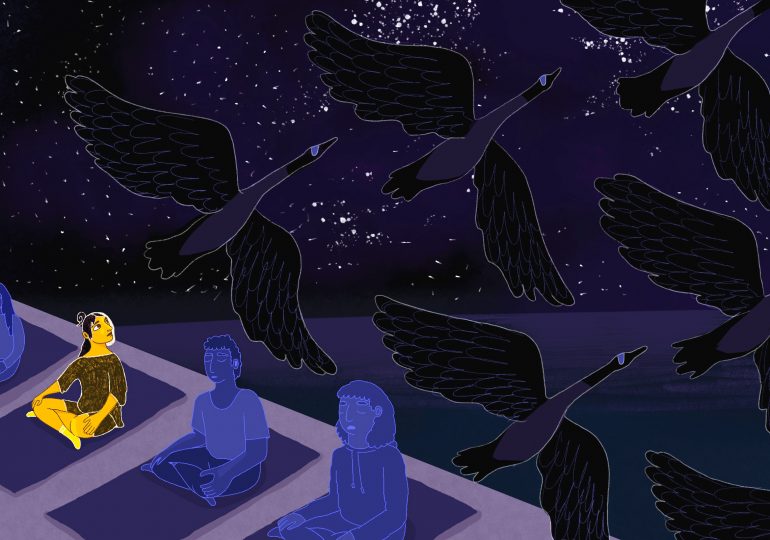Of course, there wasn’t a plunger. There’s never a plunger when you need one. But there’s always an audience: in this case, three women sitting on the other side of the thin bathroom door waiting for their turn to use a toilet which was now horribly, hopelessly clogged. I sweat over the lid trying to devise a solution but could barely hear myself think over the chorus to Leonard Cohen’s “Closing Time,” which played a relentless loop in my head, as it would every day of this retreat, at a perfect-acoustics, full-volume blare. I was three days into a 10-day, silent meditation, and absolutely at the end of my rope.
[time-brightcove not-tgx=”true”]
“Sorry to break the noble silence,” I finally told my fellow meditators. “But that toilet is clogged.” It was the first thing I’d said in three days. The words felt like poetry on my lips.
When I told friends my plan to attend the program, they were justifiably incredulous. “You can’t shut-up for 10 minutes, let alone 10 days!” they protested. (They were—and remain—correct.) But my then boyfriend was an avid meditator, and had raved about the program since we first met. Vipassana, a meditation practice originating in India over 2,500 years ago, had utterly changed his life, he told me. It made him calm, self-connected. I had just quit my day job to pursue writing full-time, and all I could sell was an article about how to make latkes. I had time to kill, is what I mean.
I said, “Ok!” to the 10-day Vipassana meditation for the same reason I said “Ok!” to moving to Chicago with him. Because I thought there was something wrong with me for instead thinking, “Run!” Love, I speculated, was the noble pursuit of making two people fit together. My pieces didn’t quite squeeze into the jigsaw puzzle of our relationship, but I thought this might sand down their edges. My boyfriend was so good, I thought (still think), and I desperately wanted to be good too.
Read More: How Listening to Silence Changes Our Brains
So off I went, first to Chicago, then the middle of seemingly nowhere, for the retreat. I signed away my wallet and cellphone; I listened to the rules: No speaking, no eye contact, no physical contact, no drugs or alcohol, no sex or masturbation, no technology, and (scariest to me) no writing. I felt like screaming, but I trusted my boyfriend more than my own instincts; if this was good for him, this will be good for me, I assured my racing heart.
Had I bothered researching Vipassana prior to attending one, I would have read plenty about the hours. We awoke at 4 a.m. each day to make it to our first meditation by 4:30 a.m. After two hours of that, we’d congregate for our 6:30 a.m. breakfast. Then a brief break. Then more meditation. Lunch. A break. More meditation. Tea. More meditation. Then a viewing of a taped lecture by an esteemed teacher of the practice. More meditation. Then bedtime to prepare to wake up and do it all again.
I had little experience with 4 a.m. prior, but it’s an eerie hour. The sky is ink-black and, in this far-flung Illinois town, littered with innumerable stars, seemingly close together but in reality, separated by vast gulfs of empty space. On our dark walks to the meditation hall, the morning chill sunk deep into my bones, and the silent stretch of land surrounding the site loomed menacing and black. “What the hell am I doing here,” I wondered. The question extended beyond the worn grass and murky pond of the campus.
In our nightly lectures, the teacher encouraged us not to think while meditating, and when a thought inevitably did cross our minds, to pass it aside without judgment. I floundered at this initially. Unintentionally, I’d screen entire films in my head (mostly M. Night Shyamalan, because even my subconscious has no taste), and analyze years-old interactions.
Constantly, helplessly, my mind kept replaying “Closing Time,” for which, unfortunately, I didn’t know all the lyrics. The result was a horrible mental performance in which Cohen would croon “And the bupbupbupbup dun-dun and the ladadadada and the Johnny Walker wisdom runnin’ high,” Plus, the campus’s picturesque geese were in the midst of mating season, so Cohen’s half-wrong lyrics were punctuated by the honking of fornicating waterfowl.
What I mean is meditating was difficult for me. But so was the time spent not meditating. Have you ever heard a cafeteria full of people eating in silence? An entire room echoing with the sound of conversation-less human mastication—all wet chewing and slippery gulps, suppressed belches and scraping silverware.
To my relief, meditating became easier, slowly, as the first days of the course passed. Whereas initially I couldn’t sit for five minutes without needing to shift my hips, I found myself still for longer and longer stretches of time. My hummingbird brain, too, slowed its vibrations; my thoughts still fluttered, but I could go stretches of time before they pulled me away. And yet, I still fantasized about leaving. Yes, I can sit here and not think, but what is the point, my mind demanded. “Run,” it urged. “Run!”
The toilet had by then resumed normal function, but I still felt stuck. In my head, I could hear all the voices pressuring me to stay, a chorus featuring my boyfriend, the gurus, every tight-bodied yoga-influencer on Instagram: “You left too soon, you didn’t take this seriously, you failed.” But faintly, I could also hear my own, equally disappointed in me, but for staying. “Run,” it whispered, tired now from repetition. “Run.” After a few days, I did. Leaving was harder than I had anticipated (leaving is always harder than we anticipate) but meditations are voluntary, even when you feel like they’re the only option.
When I reached Chicago, my boyfriend was both shocked and disappointed. (Always great when you can achieve both.) I cried a lot. I wondered if I’d ruined my chances of inner peace by leaving the meditation center. I wondered if I’d ruined our relationship by failing to appreciate his most cherished practice.
I considered leaving the life we’d built. But I didn’t. Not at first. I spent a few more months unhappy; I was sure, more so now than ever, that there had to be something wrong with me. I couldn’t meditate right. I couldn’t love right. Was there anything right about me?
Eventually, my fast-expanding misery burst like a balloon in my mouth. Pop! “This isn’t working.” The words felt like poetry on my lips. My boyfriend helped pack up my stuff and drove me to the airport. This lovely man, with real sheets on his bed and the generosity to schlep me all the way to O’Hare International Airport—I was leaving him? My intuition shouted to be heard over reason and though I thought it would break me, I hugged him goodbye and walked away. My legs nearly collapsed with relief on arrival. I was in the wrong place, with the wrong people, doing the wrong things, yes, but I wasn’t wrong. That toilet was probably busted before I ever used it.
I’d love to say I’ve followed my instincts since then, but trust is a muscle, like any other; it only grows with pain and repetition. So I kept writing, even though it seemed doomed. I moved to New York, then I moved to LA. I got rejected; I got published; usually I got ignored. I fell in love and fell out of love and fell in love all over again. I made a lot of mistakes, is what I mean. But they were my mistakes, at least; made from listening to my own inner voice, a voice which sometimes stuttered or misspoke or vocal-fried, but always rung true as my own. I made a lot of mistakes. But slowly, I started trusting that I could fix them. Even better, I could learn from them.
I didn’t finish the meditation course my ex-boyfriend recommended, but I sometimes still try to meditate. I’ll sit for 20 minutes and try to focus on my breath, on nothing else but just being, until my alarm goes off. I’m still not sure I’m doing it right. But I trust, now, that I don’t have to.
Leave a comment








